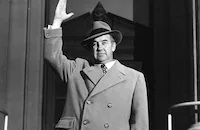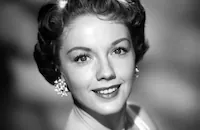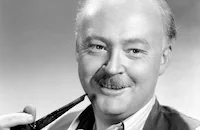Stop, You're Killing Me

Brief Synopsis
Cast & Crew
Roy Del Ruth
Broderick Crawford
Claire Trevor
Virginia Gibson
Bill Hayes
Charles Cantor
Film Details
Technical Specs

Synopsis
In New York City, after the repeal of Prohibition, bootlegger Remy Marko, encouraged by his wife Nora, decides to go straight and sell his beer legally. Unfortunately for Remy, no one will buy his foul-tasting beer and having his three faithful cohorts, Mike, Lefty and Giuseppe, use strong-arm tactics to force sales is not a legitimate business practice. In addition, Remy must now pay taxes, so money is short when the bank calls in his half-million dollar loan. Remy decides to consider his prospects at his Saratoga Springs mansion, but before leaving, his daughter Mary unexpectedly returns from school with boyfriend troubles. Mary tells her parents that her fiancé, wealthy Chance Whitelaw, will not get a job, but Remy is pleased that the romance is faltering after he learns that the Whitelaws have been in law enforcement for generations. Later, the Markos drive to Saratoga Springs, accompanied by Remy's three pals and Donnie Reynolds, an orphan boy from his favorite charitable institution. Unknown to Remy, five gangsters have robbed Sad Sam Callahan, a racetrack bookie, and are hiding out in Remy's house. Just before Remy's group arrives, Innocence, one of the robbers, kills the other four, leaving their corpses in a bedroom. Upon arriving at the mansion, Donnie begins terrorizing the household and finds the robbers' satchel of stolen money, which he hides in a chandelier. Still undiscovered, Innocence tries to get back the satchel and escape, but Donnie repeatedly outwits him. Equally defenseless against Donnie are Remy's three pals, who, having been paid with Remy's IOUs, are surprised to learn that Donnie is the only one among them with money. Meanwhile, Chance shows up in a state trooper uniform, having joined the force to please Mary, and invites her to dine with his socialite mother. Dreaming of a blue-blooded future for Mary, Nora encourages her to go, and arranges for the Whitelaws to return with Mary to the house. Later, Remy tells Nora about the bank loan, and although his pals would happily solve the problem mobster-style, Nora begs Remy to stay legitimate. The discovery of the corpses temporarily distracts Remy from his money worries. Afraid he will be accused of the murders, Remy has the men deliver the bodies to the homes of various people whom they dislike. Later, Remy's pals learn that a reward is being offered for each bandit, dead or alive, and seeing a way to pay off the loan, they retrieve the bodies, but have no opportunity to tell Remy about the reward before Mary and the Whitelaws return from dinner. A party spontaneously erupts when many of the Markos' friends come to call, including Sad Sam, several nightclub bandmembers with their instruments, a shady commissioner and dancing girls. Remy works the crowd, hoping to find someone to help him pay off the loan, and stalls the bank officers, Clyde Post and Cal Ritter, when they show up to demand payment. Despite Nora's attempts to maintain decorum, the haughty Mrs. Whitelaw, appalled by the scene, declares that the engagement is off and tries to leave, but is pulled into a vigorous dance against her will. After being rescued by Nora, she is taken to rest upstairs, where Donnie is still eluding Innocence. When the boy throws some of the stolen money to the floor below, the crowd thinks Remy is giving out expensive party favors, except for Sad Sam, who finds one of his tickets floating down with the money and concludes that Remy has robbed him. Remy, meanwhile, gets the rest of the money from Donnie and uses it to bluff Post and Ritter into granting a loan extension. In the bedroom, Mrs. Whitelaw finds the corpses, and although Remy's men sneak them to a different hiding place before the others see them, she inadvertently stumbles onto them again. As no one else sees or acknowledges the existence of the corpses, she is again urged to rest. Meanwhile, Chance, at Sad Sam's insistence, attempts to arrest Remy for the robbery, but is interrupted by a scream from Mrs. Whitelaw, who has discovered the corpses yet again, this time hanging in a closet. Thinking quickly, Nora exclaims that Mrs. Whitelaw is being harassed by the men who stole their money and sends Remy and Chance upstairs to shoot the burglars. With the help of Remy's guiding hand, Chance shoots at the closet. Although his shots miss their marks completely, he does inadvertently hit Innocence, who is escaping out the window with the money, which he finally retrieved. Remy convinces Chance and other policemen who are called to the scene that Chance heroically killed the robbers. As a result, Chance gets a reward and a promotion, and Mary and Chance proceed with wedding plans. After being convinced to "loosen her corset," Mrs. Whitelaw agrees to help Remy. The Markos decide to adopt Donnie and it appears that Remy will remain a legitimate businessman.

Director

Roy Del Ruth
Cast

Broderick Crawford

Claire Trevor

Virginia Gibson
Bill Hayes
Charles Cantor

Sheldon Leonard
Joseph Vitale

Howard St. John

Henry Morgan

Margaret Dumont
Stephen Chase

Don Beddoe
Henry Slate
Jack Pepper
Louis Lettieri
Ned Glass
Joe Mcturk
Ralph Sanford
John Crawford
Phil Arnold
Frank Richards
Mushy Callahan
Ralph Peters
Vera Marshe
Eddie Parks

Phyllis Kirk
Larry Blake
Frank Marlowe
Joann Arnold
Sherry Moreland
Dick Reeves
Dolly Jarvis
Crew
Harry Akst
Gordon Bau
Edward Carrere
Charles H. Clarke
Benny Davis
Mel Dellar
Louis F. Edelman
David Forrest
Ray Heindorf
Victor Herbert
Bob Hilliard
George James Hopkins
Stanley Jones
Norman Luboff
Moss Mabry
Owen Marks
Ted Mccord
James O'hanlon
Leroy Prinz
Howard Shoup
Carl Sigman
Robert B. Smith

Videos
Movie Clip


Film Details
Technical Specs

Articles
Stop, You're Killing Me
By Richard Harland Smith

Stop, You're Killing Me
Quotes
Trivia
Notes
June and July 1952 Hollywood Reporter news items add the following actors to the cast of the film: George Spotts, Thomas Herman, Libby Burke, Becky Davis, Delores Durrett, Dorothy Howell, Eva Lee Kuney, Joan Maloney, Kay Tapscott, Vicky Van Zandt and the Ernie Felice Quintet. However, their appearance in the released picture has not been confirmed. Although a June 1952 Hollywood Reporter news item and production chart list Edward Carrere as art director, only Charles H. Clarke is listed onscreen. Warner Bros. studios suffered a major fire during production, but according to a July 1952 Hollywood Reporter news item, shooting for Stop, You're Killing Me was not interrupted. A new type of face makeup called "Liquid Lightning" was perfected by Gordon Bau, the head of Warner Bros. makeup department, and tested during the filming of the party sequence. Warner Bros. previously had adapted Damon Runyon and Howard Lindsay's play in 1938, under the play's title, A Slight Case of Murder, starring Edward G. Robinson and directed by Lloyd Bacon (see AFI Catalog of Feature Films, 1931-40).














